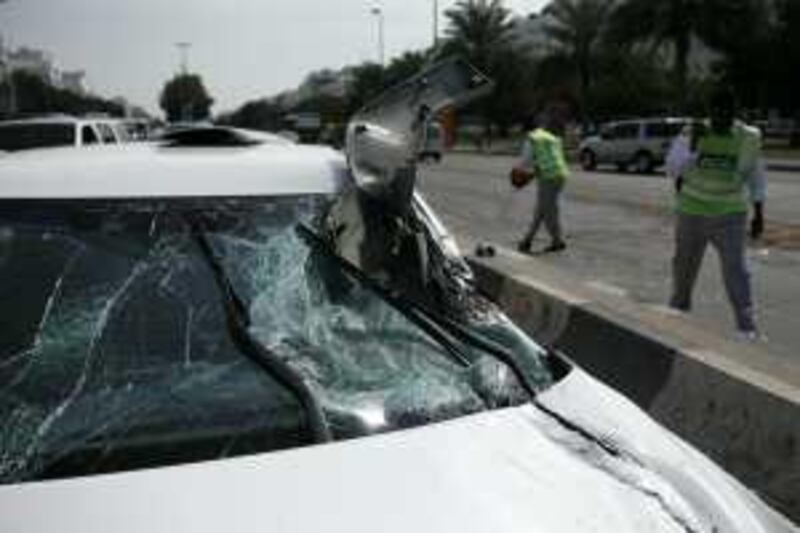DUBAI // Speeding, aggressive and underage driving, and the use of seat belts would be among the issues addressed by a proposed Abu Dhabi Road Safety Council, transport officials said yesterday. Abu Dhabi has one of the highest road-fatality rates in the world, according to figures compiled by the Health Authority-Abu Dhabi.
In June, Dr Ahmed al Mazrouei, the chairman of the HAAD, cited a figure of 27.4 deaths per 100,000 people in the emirate, declaring it an unacceptable rate. On average, 38 people die on Abu Dhabi's roads each month, according to Department of Transport statistics. The proposed Abu Dhabi Road Safety Council would be chaired by senior members of government bodies such as the police and DoT. Dr Abdulilah Zineddin, a highway safety specialist with the DoT, said the plan was still a proposal but could be finalised before the end of the year. He was speaking on the first day of the Gulf Traffic 2009 Conference, in Dubai, which focused on road safety.
The Abu Dhabi road fatality rate of 27.4 per 100,000 compares unfavourably with 11.0 deaths per 100,000 in the EU and a global mean of 21 per 100,000, according to the World Report on Road Traffic Injury Prevention, a 2004 World Health Organisation study based on data from 2000. The proposed Abu Dhabi Road Safety Council would set the agenda for campaigns and legislation aimed at reducing the number of deaths and serious injuries on the roads.
If the council is formed, it is expected to meet every two to three months. The DoT has begun carrying out road-safety audits, dispatching teams to find risks both on existing roads and those under construction. So far, 1,000 risks have been identified, including dangerous bends and blind spots. These are being addressed, according to the DoT. Dr Zineddin said a database containing figures on types of accidents was being compiled for further analysis.
He said speed limits were being reassessed according to the "crash history" of the road, the average speed of vehicles travelling on it and the limits for which the road was designed. The DoT wants to develop an awareness campaign with the emphasis on speeding, child restraints, seat belts and adjusting to weather conditions. The campaign would also target aggressive driving, underage drivers and pedestrian safety.
A Road Safety Strategy is being developed by the DoT with the aim of providing a regional framework. The strategy will be partly based on data being collected on road crashes, injuries, insurance and accident costs. It would contain safety targets as well as the budget required to meet them. According to a study of local driving behaviour carried out by Prof Abdulbari Bener, an adviser to the WHO and a senior epidemiology consultant, the UAE has some of the worst driving habits in the world.
"Breaking the red lights, getting involved in unofficial races at lights, beeping your horn in anger are all higher in the UAE than elsewhere," said Prof Bener. Other failings of UAE drivers include missing give-way signs and using the wrong lane when approaching a roundabout. Today, the second part of the conference will focus primarily on rail. Governments in the Middle East will invest more than $147 billion (Dh540bn) to address the region's transportation needs, according to the event's organisers.
eharnan@thenational.ae






